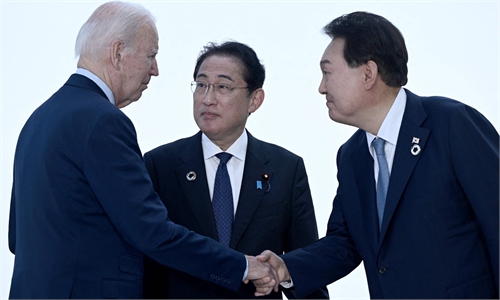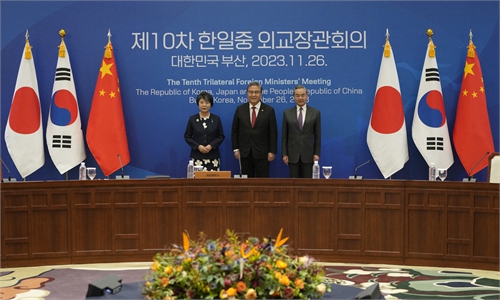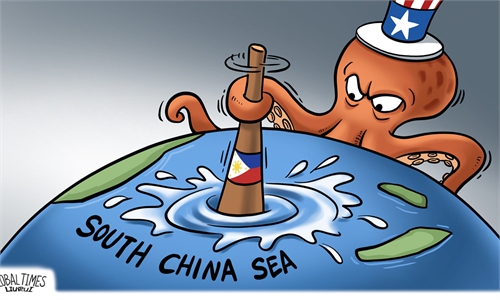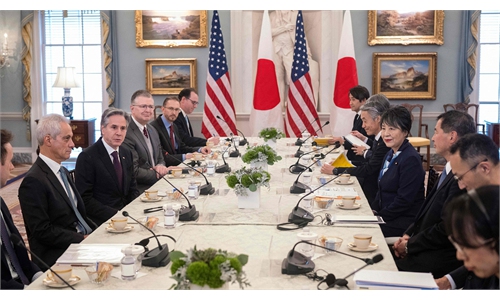US, Japan slammed as 'real threats to regional peace' with 'Cold War mentality'
Enhancing defense ties targeting China a selfish move, not welcomed by regional countries
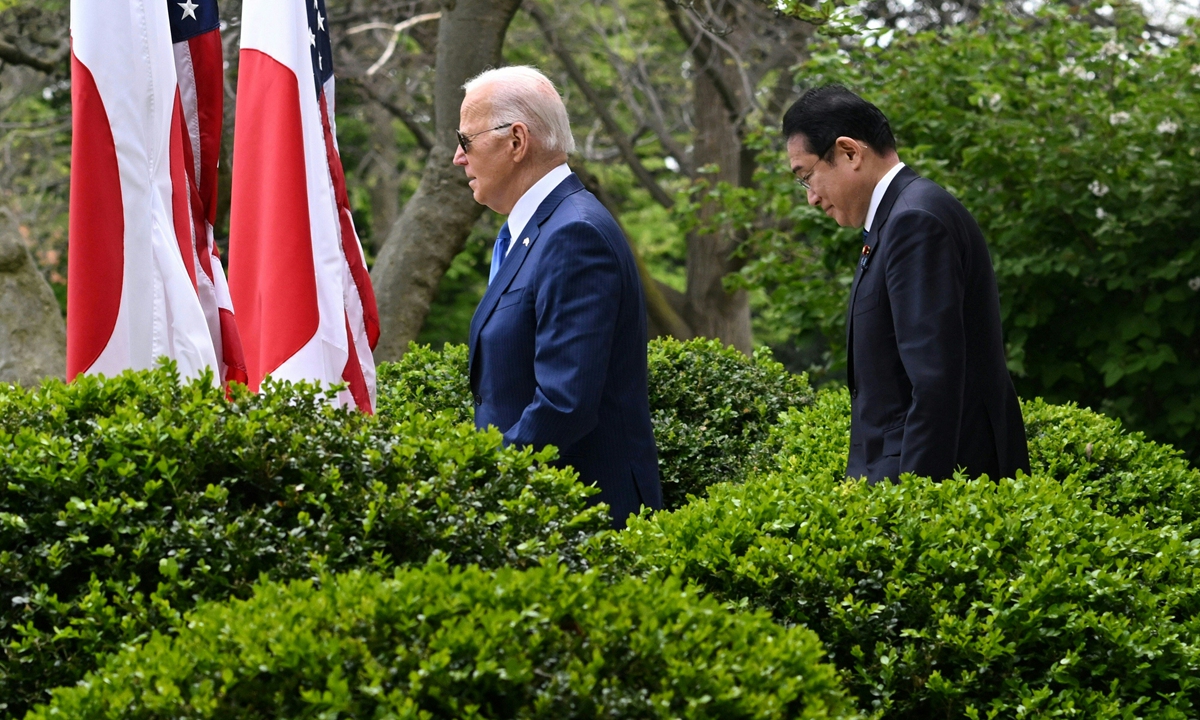
US President Joe Biden (left) and Japanese Prime Minister Fumio Kishida arrive to speak at a joint press conference in the Rose Garden of the White House in Washington, DC, April 10, 2024. Photo: AFP
The Chinese Foreign Ministry on Thursday slammed the US and Japan's "Cold War mentality" and their acts that undermine regional peace and stability, after US President Joe Biden and Japanese Prime Minister Fumio Kishida unveiled a range of moves aimed at deepening military ties, ahead of their summit with Philippine President Ferdinand Romualdez Marcos Jr, which is also regarded as having an eye on countering China, especially over the South China Sea issues.
"Despite China's serious concerns, the US and Japan attacked and smeared China on the Taiwan question and maritime issues, grossly interfered in China's domestic affairs and violated the basic norms in international relations. China deplores and opposes it, and has made serious démarches to relevant parties," said Mao Ning, a spokesperson of the Chinese Foreign Ministry, at a press briefing on Thursday.
Mao stressed that US-Japan relations should not target other countries, harm their interests or undermine regional peace and stability. "China firmly opposes the Cold War mentality and small group politics. China firmly rejects anything that creates and drives up tensions and may undermine other countries' strategic security and interests."
She said the US and Japan pose the "real threats" to regional peace and stability. China will defend its sovereignty, security and development interests, and stay committed to the peace, stability and lasting prosperity of the Asia-Pacific region, Mao said.
Unwelcomed troublemakers
Biden and Kishida met in Washington on Wednesday local time. During a joint press conference at the White House, the two leaders announced a slew of new initiatives to boost defense and intelligence ties between US and Japan, which Biden described as the "most significant upgrade in our alliance."
Citing officials, Aljazeera said the two leaders went on to discuss "as many as 70 cooperation agreements in defense, space and technology" during a meeting.
According to Biden, the two nations will "increase the interoperability and planning of our militaries." The two will also create a joint network of air missile and defense architecture, along with Australia. Biden said leaders are also exploring Japan's joining of AUKUS.
Both Kishida and Biden mentioned that they discussed the tensions over Taiwan island, the South China Sea issue, and the Russia-Ukraine conflict. Biden said the US commitment to the defense of Japan under Article 5, including China's Diaoyu Islands which Japan also claimed sovereignty over, is "unwavering."
In response, spokesperson Mao said that the Taiwan question is purely China's domestic affair and brooks no external interference, and urged the US and Japan to "keep their promises."
She also stressed that China's activities in the East and South China Seas are in full compliance with international law and there's nothing wrong about them.
She said the Diaoyu Dao and its affiliated islands are China's inherent territory. Besides, China has indisputable sovereignty over Nanhai Zhudao and its adjacent waters.
The US is speeding up its arming of Japan and making it play a greater role in Washington's military defense deployment in the Asia-Pacific region, said Li Haidong, a professor from the China Foreign Affairs University.
"This indicates that the Asia-Pacific will face more risk of escalating tensions due to the strengthening of the US-Japan alliance, which will inevitably cause concern among most countries in the Asia-Pacific region," Li added.
Despite Biden describing the US alliance with Japan as "purely defensive in nature," and "not aimed at any one nation," Kishida said he and Biden agreed that the US and Japan will "continue to respond to challenges concerning China," according to a White House release.
A common way for the US to strengthen alliances and consolidate its regional hegemony is to pick rivals and create tension and confrontation in the region, said Li, "This is a classic example of a disastrous move to satisfy strategic self-interest at the expense of other countries."
The Asia Pacific region was safe and stable, and it is precisely because the US is moving to strengthen its alliances that the security situation is becoming uncertain and fragile, Li remarked.
The US and its allies are unpopular troublemakers in the eyes of most of the region's countries, Li said.
Offensive posture
In addition to the Biden-Kishida summit, leaders of the US, Japan and the Philippines will also hold their first ever trilateral summit in Washington on Thursday local time, against the backdrop of more frequent provocations from Manila against China in the South China Sea over the past few months.
Ahead of his departure on Wednesday, Philippine President Ferdinand Romualdez Marcos Jr told media that the upcoming talks with Biden and Kishida will focus on economic cooperation and include a deal "to maintain security and freedom of navigation in the South China Sea."
Since Marcos took office, Manila has nearly doubled the number of military bases that US soldiers can access in the Philippines, with talks continuing over a reciprocal access deal to allow the presence of Japanese forces in the country.
Experts said that after the summit, the US and its allies are bound to accelerate their policy of raising tensions in the South China Sea, especially through provocations by the Philippines, which could further complicate the situation.
During a press briefing on Tuesday, White House National Security Advisor Jake Sullivan said more joint patrols can be expected in the South China Sea after the drills by the US, Australia, the Philippines and Japan last weekend.
The US is strengthening its offensive posture in the "first island chain" in the western Pacific Ocean, but China has sufficient counterattack capability, Lü Xiang, research fellow at the Chinese Academy of Social Sciences, told the Global Times on Thursday.
Some US analysts already realized a decade ago that it is meaningless to contain China through the "first island chain" blockade, as such a move is more representative of a provocative posture rather than substantial efficacy, and it may only worsen the relationship between China and the US and bring tensions into the region, Lü noted.
Experts believed that while the US needs its allies' support in global affairs and geopolitics more than ever, if Donald Trump returns to the White House, the US alliance with Japan and the Philippines will face more uncertainty along with the increasing isolationist tendencies within the US.
On Monday night, British Foreign Secretary David Cameron met with Donald Trump at the former president's Mar-a-Lago club on Monday before his scheduled meeting with Secretary of State Antony Blinken, according to CNN.
We know Trump is charging everyone a lot, and if he returns in a few months, it will be a totally different game for America's allies, Lü said.

